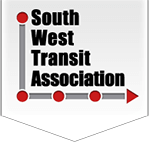South West Transit Association

SWTA’s 2021-2022 Legislative Priorities
Increase Revenue Dedicated to the Transit Trust Fund
Congress should identify a sustainable source dedicated to funding public transit. The Highway and Transit Trust Funds are now insolvent due to gas tax revues that can no longer support federal transportation program investment levels. SWTA supports efforts to achieve long-term, sustainable revenue sources but urges immediate funding stability for authorized levels of federal transit investment.
Maintain and Increase Funding for Transit Formula Programs, increasing the Bus and Bus Facilities program over FY21 investment levels
51 percent of the rides on public transportation are on buses. Improved safe and reliable service for all Americans means investing in and maintaining a well-equipped fleet.
Grow the Capital Investment Grants (CIG) and Small Transit Intensive Cities (STIC) Programs
SWTA supports an increase in funding for program that support capital projects in large urban areas and incentivized operations funding in small cities beyond FAST Act levels. We also support further streamlining of the review process to allow projects to move through the CIG pipeline more quickly.
Implement Sensible Regulations
Sale of Vehicles Past Useful Life: We support a plan to allow an agency to sell a vehicle past it’s useful life, as defined by the FTA, for market value. The agency keeps 20 percent of the original purchase price for unrestricted local funding. Anything over 20 percent goes to the FTA. Compliance can be insured by the agency providing copies of the original purchase receipt and sales receipt.
Triennial Desk Review for Smaller Agencies: This idea is focused on bus fleets under 100 buses and could improve final outcomes as well as reduce burdens on both the agency and FTA reviewer.
Charter Regulation Reform: There are three key items that could be considered.
• Communication – Notification that service by the local transit provider is not available due to a private company’s desire to provide the service. This notification should be made available to the requester in a timely fashion. Currently, there is no effective notification process, leaving the public believing the local transit provider dropped the ball.
• Accessibility - Companies who respond that they can provide the service should prove they can provide accessible vehicles and similar-type vehicles being requested.
• Availability – Companies who respond should do so in the spirit of truly being able to provide the service. It is rarely possibly that a company in Louisiana can provide two hours of service in Guymon, Oklahoma. A contiguous-states or distance limit may be a better solution than a national approach.
Allow for Flexibility in Alternative Fuel Vehicles for 5311 Providers: While SWTA supports the continued growth in low- and no-emissions vehicles across the transit industry, many of these vehicles are not currently viable in rural and tribal transit operations, where long trip distances often exceeed battery capabilities. Moreover, these vehicles are often too large in passenger capacity to deliver optimal operating efficiency in fuel use for these systems. Federal capital funding programs for vehicle purchases must allow these operators to purchase alternative fuel vehicles that best meet their service needs while also reducing emissions.
Exempt 5311 Providers from Requiements Intended for 5307 Urban Systems: The law states that the 5311 grantee must follow all rules of a 5307, inlcuding PTASP provisions, in order to receive grants for low- or no- emissions vehicles. This could present a hardship on smaller agencies. We believe a review is necessary to ensure the 5311 agency has the technical assistance needed to follow through, as capacity within the 5311 is not always available. This should not prevent 5311 providers from taking advantage of improving their fleet and providing responsible community service through a Low-No grant opportunity.
Allow Rural Agencies to Report Trips in Urbanized Areas & Count First/Last Trip Deadhead Miles: There are current transit riders being served by a 5311 rural transit provider, within a 5307 urbanized area because the 5307 provider’s service does not meet the individual’s needs. Current reporting rules only allows the larger agency to report the trip, not the smaller agency. NTD reporting needs updating that changes that allow the agency that provides the trip to count the trip for revenue purposes. Additionally, miles driven by a 5311 system in the morning to pickup the first passenger are not allowed to be counted as revenue miles. In many rural areas, the initial morning drive could be 50 to 60 miles. In this case, the system has cost with a revenue offset. The same situation occurs after the last drop off of the day.
States
Arizona, Arkansas, Colorado, Kansas, Louisiana, New Mexico, Oklahoma, Texas
